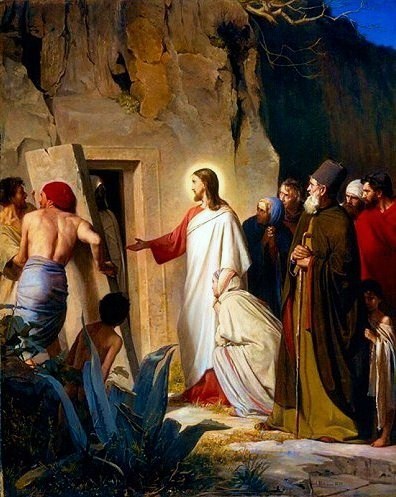Valentin Tomberg was an independent-minded
Anthroposophist who later converted to the Catholic Church, and attempted to
combine Catholicism with Christian Hermeticism. His most well-known work,
"Meditations on the Tarot", was published anonymously. "Lazarus,
Come Forth" is another important work, also published under the title
"Covenant of the Heart". Tomberg's books are complex and hence difficult
to review. They are also difficult to read cover to cover. This edition of
"Lazarus, Come Forth" is published by Lindisfarne Books. It mentions
both Tomberg's earlier, Anthroposophical writings, and those of his translator
Robert Powell, who I assume is a maverick Anthroposophist.
One difficulty is the previously mentioned attempt to combine traditional, pre-Vatican II Catholicism (including papal supremacy and infallibility) with ideas derived from various occult traditions. Although Tomberg had left the Anthroposophical Society, the book even contains positive references to Rudolf Steiner. It sounds a bit disingenuous when Tomberg first attacks those who question papal monarchy and the pope's God-given right to interpret doctrine, only to later reveal his belief in a hexadic godhead with three feminine aspects in addition to the three masculine ones of the Trinity. He also tells us that YHVH is an angel rather than God himself, implies that reincarnation is real, and interprets various aspects of the Kabbala. The need to study the writings of Origen is seen as self-evident, despite this Platonizing Church Father being pronounced a heretic by the Catholic Church! One annoying aspect of Tomberg's thinking is the strong emphasis on hierarchy, with its concomitant attacks on democracy and (surprise) socialism.
The author accepts the reality of evolution, but believes that evolution is almost literally evil. It's the path of the serpent, promising a false salvation: "Ye shall be as gods". Evolution is purely "horizontal", meandering, and leads to constant competition, destruction and suffering. It's logical endpoint is Hell, or perhaps hell on Earth, when the human collective becomes "god without God". True Christianity represents salvation and liberation from evolution and the entire material universe of deterministic cause-and-effect. It's a new force, almost alien, which miraculously irrupts into our world so to speak from the outside. Salvation lay in a higher realm of divine archetypes, of which Nature is only a pale reflection, distorted by the snake. Tomberg affirms both the cataphatic and apophatic paths, but he clearly views the latter as higher and more important, it being the true path to salvation as exemplified by Dionysius the Areopagite and John of the Cross. The author also emphasizes that salvation is individual, with the collective representing materialism and death.
I get the impression that Tomberg's perspective is really a form of world-denying Gnosticism, with the world being created by the Devil. There are no solutions to this problem, except escape...
The above is based on those parts of the book I've read and (perhaps) digested so far. I'm sure there are other aspects of "Lazarus, Come Forth" which I might have missed. Although Tomberg does say interesting and profound things from time to time, I can't say I like the overall context. It's too conservative, too Gnosticizing and very eclectic. It resembles the Traditionalism of Guénon to some extent, although I suspect Tomberg's interests in various modern forms of occultism, not to mention his support for the Jesuits, is enough to place him beyond the pale in such circles...
In the end, I give Valentin Tomberg's meditations three stars.

No comments:
Post a Comment